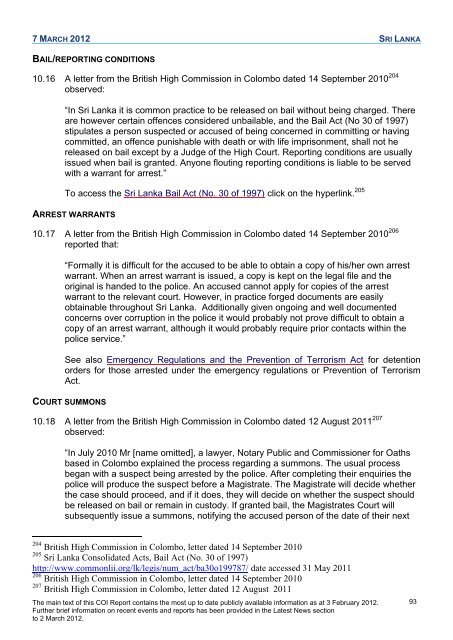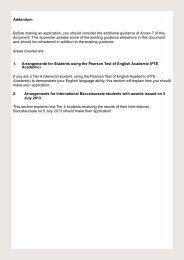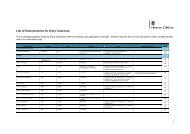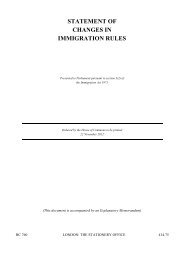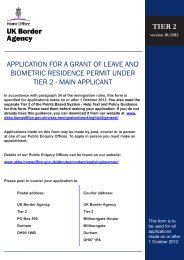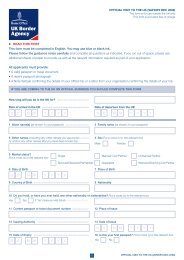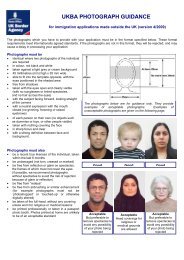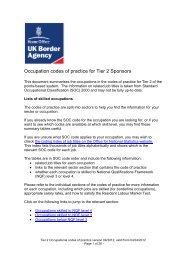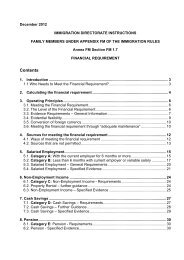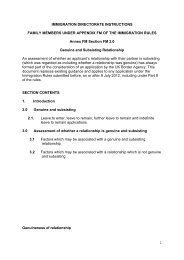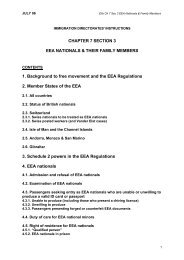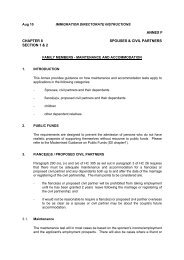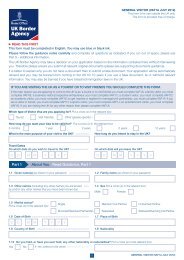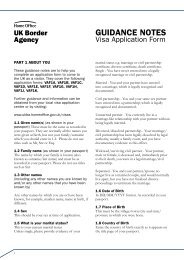COI Report March 2012 - UK Border Agency - Home Office
COI Report March 2012 - UK Border Agency - Home Office
COI Report March 2012 - UK Border Agency - Home Office
Create successful ePaper yourself
Turn your PDF publications into a flip-book with our unique Google optimized e-Paper software.
7 MARCH <strong>2012</strong> SRI LANKA<br />
BAIL/REPORTING CONDITIONS<br />
10.16 A letter from the British High Commission in Colombo dated 14 September 2010 204<br />
observed:<br />
―In Sri Lanka it is common practice to be released on bail without being charged. There<br />
are however certain offences considered unbailable, and the Bail Act (No 30 of 1997)<br />
stipulates a person suspected or accused of being concerned in committing or having<br />
committed, an offence punishable with death or with life imprisonment, shall not he<br />
released on bail except by a Judge of the High Court. <strong>Report</strong>ing conditions are usually<br />
issued when bail is granted. Anyone flouting reporting conditions is liable to be served<br />
with a warrant for arrest.‖<br />
To access the Sri Lanka Bail Act (No. 30 of 1997) click on the hyperlink. 205<br />
ARREST WARRANTS<br />
10.17 A letter from the British High Commission in Colombo dated 14 September 2010 206<br />
reported that:<br />
―Formally it is difficult for the accused to be able to obtain a copy of his/her own arrest<br />
warrant. When an arrest warrant is issued, a copy is kept on the legal file and the<br />
original is handed to the police. An accused cannot apply for copies of the arrest<br />
warrant to the relevant court. However, in practice forged documents are easily<br />
obtainable throughout Sri Lanka. Additionally given ongoing and well documented<br />
concerns over corruption in the police it would probably not prove difficult to obtain a<br />
copy of an arrest warrant, although it would probably require prior contacts within the<br />
police service.‖<br />
See also Emergency Regulations and the Prevention of Terrorism Act for detention<br />
orders for those arrested under the emergency regulations or Prevention of Terrorism<br />
Act.<br />
COURT SUMMONS<br />
10.18 A letter from the British High Commission in Colombo dated 12 August 2011 207<br />
observed:<br />
―In July 2010 Mr [name omitted], a lawyer, Notary Public and Commissioner for Oaths<br />
based in Colombo explained the process regarding a summons. The usual process<br />
began with a suspect being arrested by the police. After completing their enquiries the<br />
police will produce the suspect before a Magistrate. The Magistrate will decide whether<br />
the case should proceed, and if it does, they will decide on whether the suspect should<br />
be released on bail or remain in custody. If granted bail, the Magistrates Court will<br />
subsequently issue a summons, notifying the accused person of the date of their next<br />
204 British High Commission in Colombo, letter dated 14 September 2010<br />
205 Sri Lanka Consolidated Acts, Bail Act (No. 30 of 1997)<br />
http://www.commonlii.org/lk/legis/num_act/ba30o199787/ date accessed 31 May 2011<br />
206 British High Commission in Colombo, letter dated 14 September 2010<br />
207 British High Commission in Colombo, letter dated 12 August 2011<br />
The main text of this <strong>COI</strong> <strong>Report</strong> contains the most up to date publicly available information as at 3 February <strong>2012</strong>.<br />
Further brief information on recent events and reports has been provided in the Latest News section<br />
to 2 <strong>March</strong> <strong>2012</strong>.<br />
93


